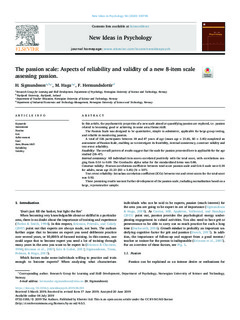The passion scale: Aspects of reliability and validity of a new 8-item scale assessing passion.
Journal article, Peer reviewed
Published version
Permanent lenke
http://hdl.handle.net/11250/2643410Utgivelsesdato
2019Metadata
Vis full innførselSamlinger
Sammendrag
In this article, the psychometric properties of a new scale aimed at quantifying passion are explored, i.e. passion related to becoming good or achieving in some area/theme/skill.
The Passion Scale was designed to be quantitative, simple to administer, applicable for large-group testing, and reliable in monitoring passion.
A total of 126 participants between 18 and 47 years of age (mean age = 21.65, SD = 3.45) completed an assessment of Passion Scale, enabling us to investigate its feasibility, internal consistency, construct validity and test-retest reliability.
Feasibility
The overall pattern of results suggest that the scale for passion presented here is applicable for the age studied (18–47).
Internal consistency
All individual item scores correlated positively with the total score, with correlations ranging from 0.51 to 0.69. The Cronbach's alpha value for the standardized items was 0.86.
Construct validity
Pearson correlations coefficient between total score passion scale and Grit-S scale were 0.39 for adults, mean age 21.23 (SD = 3.45) (N = 107).
Test-retest reliability: Intraclass correlation coefficient (ICCs) between test and retest scores for the total score was 0.92.
These promising results warrant further development of the passion scale, including normalization based on a large, representative sample.

